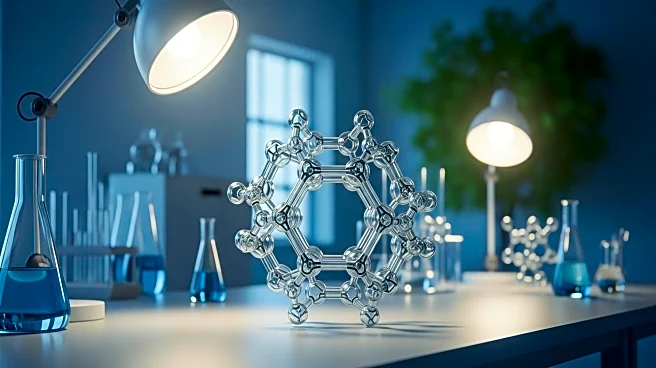What is the story about?
What's Happening?
Bioengineers at Kobe University have developed a biodegradable plastic alternative to PET, known as PDCA, which is produced using engineered E. coli bacteria. This new compound, pyridinedicarboxylic acid (PDCA), is created from glucose and offers superior physical properties compared to PET. The research team, led by Tsutomu Tanaka, has successfully produced PDCA in bioreactors at concentrations significantly higher than previously achieved, without generating unwanted byproducts. This breakthrough addresses the environmental issues associated with traditional plastics, which are derived from petroleum and contribute to pollution. The development of PDCA represents a significant advancement in bioengineering, offering a sustainable and renewable alternative to conventional plastics.
Why It's Important?
The creation of PDCA is a major step forward in the quest for sustainable materials. Traditional plastics pose significant environmental challenges due to their durability and petroleum-based origins. By offering a biodegradable alternative, PDCA could reduce plastic pollution and dependency on non-renewable resources. This innovation also highlights the potential of bioengineering to create high-performance materials that are environmentally friendly. The ability to produce PDCA efficiently and without byproducts could lead to cost-effective manufacturing processes, making sustainable plastics more accessible to industries and consumers. This aligns with global efforts to reduce carbon emissions and promote sustainable practices.
What's Next?
The next phase for PDCA involves scaling up production and exploring commercial applications. Researchers may focus on optimizing the production process to further increase yield and reduce costs. As PDCA gains recognition, it could attract interest from industries seeking sustainable alternatives to traditional plastics, potentially leading to partnerships and investments. The success of PDCA could also inspire further research into other biodegradable materials, expanding the range of sustainable options available. Additionally, regulatory bodies might consider supporting the adoption of biodegradable plastics through incentives or policy changes.
Beyond the Headlines
The development of PDCA could have broader implications for the bioengineering field, demonstrating the potential to harness cellular metabolism for sustainable material production. This approach could pave the way for new bioproduction strategies that incorporate elements like nitrogen, expanding the possibilities for bio-manufacturing. The success of PDCA might also influence consumer preferences, as demand for environmentally friendly products continues to grow. Furthermore, the research underscores the importance of interdisciplinary collaboration in addressing complex environmental challenges, highlighting the role of bioengineering in creating innovative solutions.















